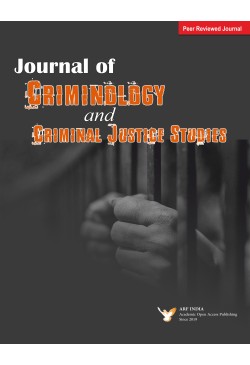JCCJSJournal of Criminology and Criminal Justice Studies

Peer Reviewed Journal

Peer Reviewed Journal
Utilitarian Epistemology of Medical and Recreational Marijuana versus Conventional Drug Law Enforcement in Nigeria: Which Way to Go?
Cannabis Sativa popularly called Marijuana has remained an enigmatic plant for centuries essentially due to its medicinal and recreational utility. However Marijuana usage has been shrouded in controversies over time across the globe ranging from varying degrees of controls, legal barriers and criminalisation. In the face of all these aforesaid encumbrances, its usage and applications have remained progressive. Consequently, the realities of the 21st century has made the relevance of marijuana quite imperative in the field of medicine and indeed the political economy of capitalist societies. In the light of this, the USA, some western countries and indeed even some African countries have significantly de-criminalised the use of marijuana for medical, recreational and most importantly as a dependable source of income. This work therefore, seeks to explore the intrinsic utility of this economic crop as the basis for useful policy recommendation towards overhauling the wobbling and apparently ineffective Drug Law Enforcement administration in Nigeria in tandem with global realities.
Keywords: Utilitarian, Medical Marijuana, Conventional Nigeria, Drug Law, Enforcement, Epistemology
Ngboawaji Daniel Nte, Brebina Kelvin Enoke & Arifin Ridwan (2024). Utilitarian Epistemology of Medical and Recreational Marijuana versus Conventional Drug Law Enforcement in Nigeria: Which Way to Go?. Journal of Criminology and Criminal Justice Studies, 2: 2, pp. 121-148. https://doi.org/10.47509/JCCJS.2024.v02i02.01
Evolving Dynamics of Federal Cocaine Sentencing Policies: Assessing the Impact of the Fair Sentencing Act 2010 on Sentencing Decisions in Crack and Powder Cocaine Cases
This study investigates the impact of the Fair Sentencing Act 2010 (FSA) on federal cocaine sentencing outcomes, focusing on the racial and ethnic disparities in substantial assistance (SA) departures, sentence discounts, and sentence length. Drawing on the focal concerns perspective and Bushway and Forst (2013) discretion framework, hypotheses were formulated to Analysis of federal cocaine sentencing data revealed that although FSA did not significantly affect the likelihood of a SA departure, it led to increased sentence discounts and reduced average sentences for crack cases. Additionally, racial and ethnic disparities persisted, with Blacks and Hispanics receiving harsher treatment compared with their White counterparts. The study highlights the ongoing influence of focal concerns in sentencing decisions, suggesting the need for comprehensive reforms within the criminal justice system to address these persistent disparities.
Keywords: crack cocaine, Fair Sentencing Act 2010, federal sentencing, powder cocaine
Makeela J. Wells (2024). Evolving Dynamics of Federal Cocaine Sentencing Policies: Assessing the Impact of the Fair Sentencing Act 2010 on Sentencing Decisions in Crack and Powder Cocaine Cases. Journal of Criminology and Criminal Justice Studies, 2: 2, pp. 149-169. https://doi.org/10.47509/JCCJS.2024.v02i02.02
Criminal-legal Systems and Undergraduate Students: An Exploratory Survey
Research has documented the impact of criminal-legal systems on incarcerated people, formerly incarcerated people, and the family of incarcerated people, especially minor children and intimate partners. Less is known about how these systems impact the extended family, adult children, and friends of justice-involved people. A survey of students at a public regional University in the northeast part of the U.S. was conducted to build knowledge about the extent to which college students are impacted by criminal-legal systems. A convenience sample of 195 undergraduates found that 57% of them had a friend or family member who had been incarcerated or supervised by parole or probation. These findings speak to the intersecting oppressions that college students negotiate and the need to provide them with supportive services and programs related to criminal-legal impact. Future research can further explicate how relationships with justice-involved people impact college students’ psychosocial outcomes.
Keywords: Incarceration, college students, family of incarcerated people
Amy B. Smoyer, Karen D’Angelo, Mellody Massaquoi, Emily Ziemba, BSW, Shoshana Mohan & Sedona Worth (2024). Criminal-legal Systems and Undergraduate Students: An Exploratory Survey. Journal of Criminology and Criminal Justice Studies, 2: 2, pp. 171-183. https://doi.org/10.47509/JCCJS.2024.v02i02.03
African American Male Youth Perceptions of Police Officers That Patrol in Urban Communities: The Cumulative Effect of Police Interaction
Researchers have explored the experiences of young African American men when interacting with police officers, while paying little attention to the cumulative effect of police interaction over the life cycle. The perception of police officers that patrol in low-income communities is manifested through experiences over several stages of development. This study draws from 5 focus groups consisting of 43 African American males in middle school, high school and undergraduate students at a predominately White and an historically black institution. The study uses a grounded theory approach to examine the development of African American males’ perception of police officers from middle school through early adulthood . The findings suggest that their perceptions change over time as they interact more with police officers.
Terrence T. Allen (2024). African American Male Youth Perceptions of Police Officers that Patrol in Urban communities: The Cummulative Effect of Police Interaction. Journal of Criminology and Criminal Justice Studies, 2: 2, pp. 185-197. https://doi.org/10.47509/JCCJS.2024.v02i02.04
Risk and Resilience: Mitigating Corruption Vulnerability When Managing Informers
Corrupt relationships between investigators and informers can compromise the integrity of the criminal justice system. Supervision of relationships between individual investigators and individual informers is impeded by lack of transparency in the information transactions. Drawing upon behavioural theory and structural theory approaches to corruption mitigation, this paper identifies a purpose-process-product-people taxonomy of vulnerabilities in relation to informer management. This framework is applied in arguing that dedicated informer handling units and mechanisms are an improvement of traditional investigator-informer relationship management because of the enhanced opportunities for supervising handlers and the reduced opportunities to exploit vulnerabilities in which corruption might otherwise flourish.
Keywords: Informers; corruption; process; covert investigation management
Clive G. Harfield (2024). Risk and Resilience: Mitigating Corruption Vulnerability When Managing Informers. Journal of Criminology and Criminal Justice Studies, 2: 2, pp. 199-217. https://doi.org/10.47509/JCCJS.2024.v02i02.05